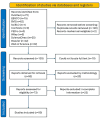Evaluation criteria for diagnosing motoric cognitive risk syndrome: a scoping review
- PMID: 40390710
- PMCID: PMC12088669
- DOI: 10.1590/1980-5764-DN-2024-0208
Evaluation criteria for diagnosing motoric cognitive risk syndrome: a scoping review
Abstract
Dementia encompasses a range of cognitive disorders marked by declining abilities in attention, memory, and social cognition. Considering this theme, motoric cognitive risk syndrome arises as a promising response to long-term care and early dementia detection although it is a pre-dementia stage.
Objective: Considering that the early identification of individuals at higher risk of developing dementia could be key for the development of preventive actions, we conducted a scoping review to investigate the instruments used for the diagnosis of motoric cognitive risk syndrome.
Methods: we searched ten electronic databases for studies presenting the assessment of motoric cognitive risk syndrome published between 2019 and 2023. Two independent reviewers screened studies according to including criteria using Mendeley Desktop software to collect, eliminate duplicates and facilitate full-text readings.
Results: From an initial 225 publications related to motoric cognitive risk syndrome, 67 studies were considered eligible for full-text review. Some of those studies presented information for more than one sample, totalizing 82 studies in this scoping review.
Conclusion: Although the diagnostic criteria to identify motoric cognitive risk syndrome are well defined in the literature, there is no description of a structured protocol or list of instruments recommended to evaluate this condition.
A demência abrange uma série de distúrbios cognitivos marcados pelo declínio das habilidades de atenção, memória e cognição social. Considerando-se este tema, a síndrome de risco cognitivo motor surge como resposta promissora aos cuidados de longa duração e à detecção precoce da demência, embora seja uma fase pré-demência.
Objetivo: Considerando-se que a identificação precoce de indivíduos com maior risco de desenvolver demência pode ser crucial para o desenvolvimento de ações preventivas, realizamos uma revisão de escopo para investigar os instrumentos utilizados para o diagnóstico da síndrome de risco cognitivo motor.
Métodos: Pesquisaram-se dez bases de dados eletrônicas em busca de estudos que apresentassem a avaliação da síndrome de risco cognitivo motor publicados entre 2019 e 2023. Dois revisores independentes selecionaram os estudos de acordo com critérios de inclusão usando o software Mendeley Desktop para coletar, eliminar duplicatas e facilitar a leitura do texto completo.
Resultados: Do total inicial de 225 publicações relacionadas à síndrome de risco cognitivo motor, 67 estudos foram considerados elegíveis para a revisão de texto completo. Alguns desses estudos apresentaram informações para mais de uma amostra, totalizando 82 estudos nesta revisão de escopo.
Conclusão: Embora os critérios diagnósticos para a identificação da síndrome de risco cognitivo motor estejam bem definidos na literatura, não há descrição de protocolo estruturado ou lista de instrumentos recomendados para avaliar essa condição.
Keywords: Cognition; Diagnosis; Gait; Mental Status and Dementia Tests; Public Health.
Conflict of interest statement
Disclosure: There authors report no conflict of interest.
References
-
- Brucki SMD, Aprahamian I, Borelli WV, Silveira VC, Ferretti CEL, Smid J, et al. Manejo das demências em fase avançada: recomendações do Departamento Científico de Neurologia Cognitiva e do envelhecimento da Academia Brasileira de Neurologia. Dement Neuropsychol. 2022;16(3 suppl 1):101–120. doi: 10.1590/1980-5764-DN-2022-s107PT. - DOI - PMC - PubMed
Publication types
LinkOut - more resources
Full Text Sources


